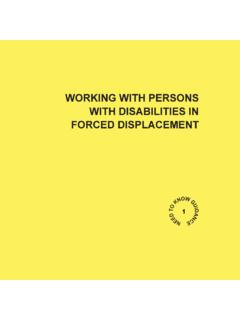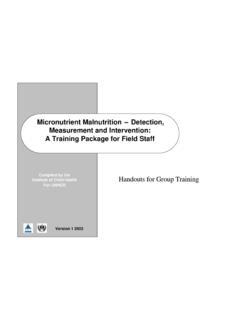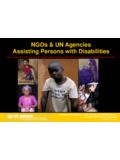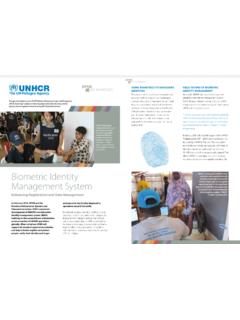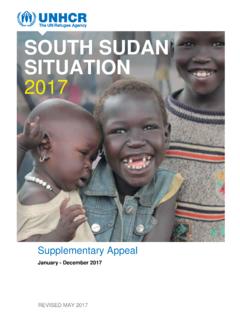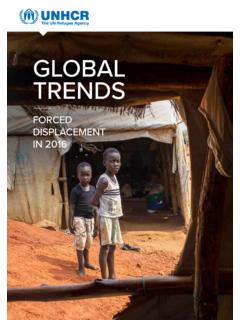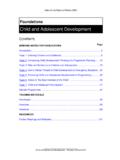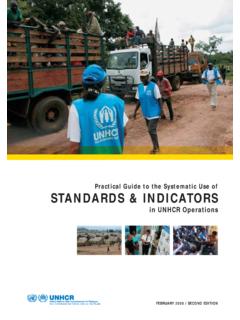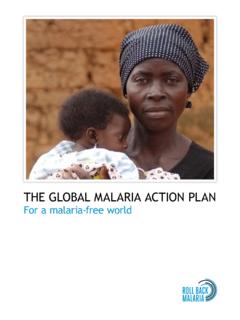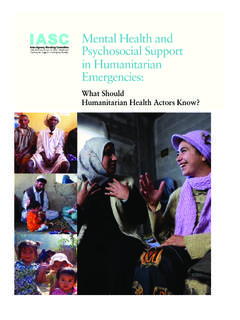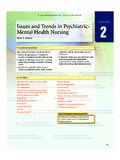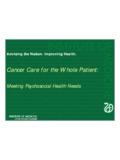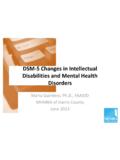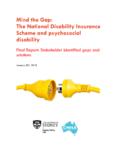Transcription of UNHCR’s meNtal HealtH aNd psyCHosoCial sUppoRt
1 UNHCR s meNtal HealtH aNd psyCHosoCial sUppoRt for Persons of ConCernGlobal Review 2013sarah Meyer, ConsultantPolicy Development and evaluation serviceAcknowledgementIt has been widely documented that the legal, social and financial impacts of being a refugee can be complex and deleterious. It is now coming to the fore that much the same can be said for the psychological impact of being a refugee or internally displaced person. This evaluation reports on how well UNHCR considers and provides for the well-being and meNtal HealtH of the Persons of Concern to this agency. A perspective on the meNtal HealtH and Psycho-Social sUppoRt (MHPSS) to Persons of Concern offers a new way to look at humanitarian assistance.
2 It calls into question the appropriateness, sensitivity, and empathy of humanitarian interventions and demands that humanitarian agencies sUppoRt avenues for displaced people to address and heal their own trauma. These demands pose a significant challenge for humanitarian organizations since many of the countries we work in do not have well developed meNtal HealtH infrastructures and therapeutic solutions need to be resourced or developed within the displaced community. In some cases, addressing meNtal HealtH also requires a technical expertise that has not always been present in the usual roster of humanitarian responders.
3 Yet despite these challenges, the field based staff surveyed for this evaluation overwhelmingly agreed that MHPSS programs contribute toward the protection of Persons of Concern . Nevertheless, MHPSS is an emerging and sometimes ambiguous perspective for UNHCR as well as for many other humanitarian actors. Thus, the evaluation begins with definitions of psycho-social sUppoRt and examples. As this evaluation discovered, MHPSS activities in UNHCR may exist as an adjunct to other programmes or by another name. Many thanks to Sarah Meyer, the author of this global review, for her expertise and up to date overview on the field of MHPSS in humanitarian interventions.
4 Through her knowledge, sensitivity and persistence she was able to discern UNHCR s level of engagement in providing MHPSS programmes to Persons of Concern. Sarah was also assisted by Nora McGann, Research Assistant from the School of Foreign Service at Georgetown University. Sincere thanks to the Steering Committee members of this review: Sabine Rakotomalala of Terre des Hommes - Switzerland, Dr. Mark Van Ommeren from the World HealtH Organization, and Marian Schilperoord and Stefanie Krause of UNHCR. Their advice and guidance were invaluable to this document. Most generous thanks to field based colleagues who informed the review by reporting on the importance and realities of providing MHPSS activities to Persons of Concern.
5 For it stands to reason that a truly durable solution can only be present for an individual who has found a way to cope and create a viable sUppoRt network in displacement. Gratefully, MaryBeth Morand Senior Policy & Evaluation Officer United Nations High Commissioner for Refugees Policy Development & Evaluation Service Geneve, June 2013 This document is for general distribution. All rights reserved. Reproductions and translations are authorised, except for commercial purposes, provided the source is photo: UNHCR / A. Branthwaite Back-cover photo: UNHCR / A. FazzinaLayout and Design: BakOS DESIGNT able of ContentsAcknowledgement.
6 3 Acronyms ..5 List of figures, tables, textboxes and annexes ..6executive summary ..7 Key findings and recommendations of this review: ..81. Introduction ..112. meNtal HealtH and psyCHosoCial sUppoRt development of a field of practice ..15 definitions ..15 meNtal HealtH and psyCHosoCial sUppoRt : ..15 What does psyCHosoCial mean? ..17 Approach vs. intervention ..18 Key influences on the development of the field: ..21 Recognition of MHPSS needs in humanitarian settings: ..21 Conceptual developments ..22 Influences of research ..22 emerging consensus The IASC Guidelines on meNtal HealtH and psyCHosoCial sUppoRt in Emergency Settings.
7 26 Use of the Guidelines in the MHPSS field ..293. UnHCr and MHPss: mapping activities and policies ..35 survey findings ..35 MHPSS mapping ..37 in-depth analysis: mHpss and the syria response ..43 Context ..43 UNHCR Syria program response ..44 MHPSS response in host countries ..46 UNHCR policy guidelines and mHpss ..47 Sexual and gender-based violence ..49 Child protection ..50 Education ..50 Community-based approaches ..52 IASC Guidelines ..54 UNHCR and the mHpss framework ..564. findings and recommendations for UnHCr s MHPss Activities ..575. Conclusion.
8 70 Acronyms aGdm Age, gender and diversity mainstreaming CBo Community Based Organisation eCd Early Childhood Development iasC Inter-agency Standing Committee idp Internally Displaced Person iom International Organisation for Migration imC International Medical Corps mhGap meNtal HealtH Gap Action Program mHpss meNtal HealtH and psyCHosoCial sUppoRt NGo Non-Governmental Organisation pFa Psychological First Aid poC Persons of Concern ptsd Post-Traumatic Stress Disorder sGBV Sexual and Gender-Based Violence UNiCeF United Nations Children s Fund WHo World HealtH Organisation5A Global
9 ReviewList of figures, tables, textboxes and annexesFigure 1: IASC Guidelines Intervention Pyramid ..27 Tables:Table 1: Respondents, by region ..35 Table 2: Attitudes towards MHPSS ..35 Table 3: Responses to the question: The need for MHPSS programs is identified ..37 Table 4: Mapping of activities across 11 countries ..38 Table 5: Activities less represented in survey responses ..41 Table 6: Activities in meNtal HealtH services in the existing primary HealtH care system and specialised meNtal HealtH care ..42 Table 7: Current MHPSS tools, indicators and activities for monitoring and evaluation.
10 59 Table 8: % of respondents reporting selected protection activities ..64 Textboxes: section 2 Textbox 1: Definitions of meNtal HealtH , psyCHosoCial and MHPSS utilised in this review ..15 Textbox 2: Program snapshot: Nutrition and Early Childhood Development [ECD] ..18 Textbox 3: MHPSS approach vs. MHPSS interventions a definition ..19 Textbox 4: What are the most important influences on well-being in humanitarian settings? ..23 Textbox 5: Resources and resilience ..25 Textbox 6: Program snapshot: Community spaces ..28 Textbox 7: The 4Ws: mapping MHPSS activities ..31 Textbox 8: The challenge of evaluation.
